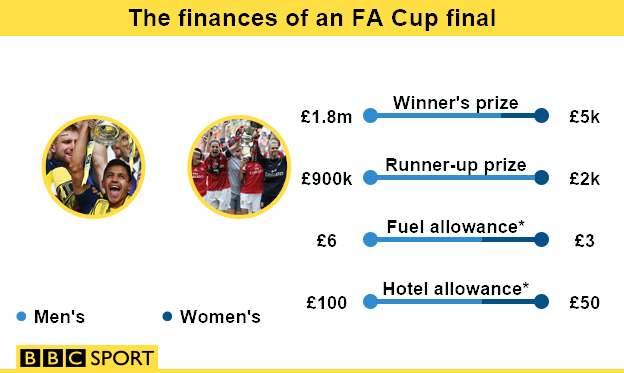Women's FA Cup: Wembley win may not benefit clubs financially
- Published
FA Cup finances 'have to increase'
Women's FA Cup final - Chelsea v Notts County |
|---|
Venue: Wembley Stadium. Kick-off: Saturday, 1 August - 15:00 BST |
Coverage: BBC One, BBC 5 live, BBC Radio Nottingham, BBC London 94.9 and live text commentary on BBC Sport website |
Notts County stand to lose money from playing in the Women's FA Cup, even if they win Saturday's final at Wembley.
The Magpies have covered costs of hosting two rounds and are only partially subsidised for travel and accommodation, while the total prize money for winning is just £8,600.
"I think that will have to be reviewed to take the game forward," manager Rick Passmoor told BBC Sport.
Clubs in the final do not directly get a share of gate receipts or TV revenue.
Up until the semi-finals, host clubs pay all expenses for the match, including match officials, while also retaining gate receipts.
Expense of getting to Wembley

*Fuel allowance per mile covered by the FA. Hotel allowance per person.
The Football Association covers costs of the semi-final and final and also pays travel and accommodation expenses. However, Notts will receive just half the subsidy that their male counterparts were entitled to for miles travelled by coach and for hotels.
While Notts can claim up to £3 per coach mile for the final, men's teams are allowed up to £6 where an overnight stay is agreed for all rounds. For three rounds, between the third and quarter-finals, women's clubs can only claim £1 for a coach travel per mile.
Meanwhile, men's clubs can claim £100 per person, for up to 25 people, for accommodation during the competition. For the semi-final and final alone, women have an allowable expense of £50 for 20 people. The FA pays hotel expenses from the third round of the Women's FA Cup, but before the last four that can not exceed £30.
Women's FA Cup final: Watch great goals from past finals
Notts do receive £70,000 from the FA Women's Super League Club Grant Programme, while seven players are on central contracts worth just over £21,000 per year. The Football Association says it has put £12.1 million into women's football this year.
However, the FA would not comment specifically on the discrepancy in expenses.
"In 2015 the FA's annual investment into women's football totals £12.1 million, from the international and domestic games to grassroots level," a statement from the FA said.
"When we launched Game Changer strategy in 2012, our long-term aim was to build a fully-professional league with clubs that work to strong, sustainable business models.
"We want to direct investment to the areas where we think it will have the most impact and this includes England Women players' central contracts and the FA Women's Super League Club Grant Programme - which enables many clubs to operate."
Benefit from exposure
It is not yet known exactly how much Notts County could lose from their FA Cup run.
But, when asked about the financial implications, Passmoor said: "It's experience. I know that happens, so that is why you need people in the football club behind you.
Women's FA Cup final: Key stats & great moments
"Going forward the prize money will have to change. I'm sure it will be at the forefront of somebody's agenda at the FA."
The FA's statement added they hoped the clubs would benefit from the "exposure" of the final and confirmed this week that the showpiece game would continue at Wembley in the future.
"We review prize money annually but it is governed by a number of factors including attendances and commercial and television revenues, such as that received from the BBC, who are broadcasting the final," their statement continued.
"Our new Women's FA Cup partnership with SSE will see significant investment made at grassroots level, as well as the competition itself, to ensure the benefits filter to all areas of the game.
Prize fund for FA competitions | |||
|---|---|---|---|
Round | FA Cup | FA Vase | Women's FA Cup |
Second-round qualifying | £4,500 | £800 | £200 |
First-round proper | £18,000 | £900 | £250 |
Quarter-final | £360,000 | £4,500 | £1,000 |
Runner-up | £900,000 | £17,000 | £2,000 |
Winner | £1.8m | £25,000 | £5,000 |
"We've seen that landmark events, such as this summer's World Cup, have had a substantial impact at club and domestic level with FA Women's Super League attendances 41% up on this time last year. We hope the exposure that the Cup final will give to both clubs will have a wider impact on them throughout this season and onwards.
"The FA is fully committed to the growth and development women's football and will continue to invest in the areas we believe will have the biggest, most positive impact on players, coaches, clubs and supporters at all levels."
Lifting the cup is priceless
Notts County chief executive Luke Negus-Hill would not talk specifically about the windfall and expense of reaching the final, and said their focus would be solely on the match.
"I don't think it is about money on the day, it is about going out there and winning the trophy," Negus-Hill told BBC Sport.
"It is arguably the biggest cup in any football competition, be it men's or women's. At Wembley, winning the FA Cup - that is what dreams are made of."
- Published1 August 2015

- Published31 July 2015

- Published29 July 2015

- Published20 June 2016

- Published7 June 2019
